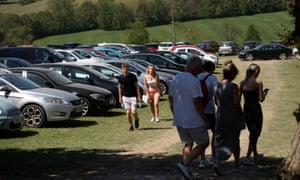Mountaineering and hill-walking groups have warned some of the UK’s most popular mountains and national parks will be inundated after the lockdowns end in Scotland and Wales.
They fear there could be chaotic scenes and significant overcrowding in areas such as Glen Coe, Loch Lomond, Snowdonia and the Brecon Beacons, putting local services, roads and mountain rescue teams under intense pressure.
Stuart Younie, the chief executive of the Mountaineering Council of Scotland, said the expected easing of the lockdown in Scotland coincided with the school holidays, with hundreds of thousands of people seeking local alternatives to summer breaks abroad.
“I think there’s a real risk that we have a big exodus of people [from urban areas], who are all desperate to get out there, back to the outdoors. I think there will be a lot of pressure in popular areas,” he said. “It’s a bit of a perfect storm, potentially.”
The Welsh and Scottish governments are phasing out their national lockdowns, which have been stricter than in England, from early July. In Wales, the “stay local” guidance is expected to end on 5 July, opening the country up to holidaymakers from across the UK.
Nicola Sturgeon, Scotland’s first minister, announced on Wednesday that she would lift the restrictions on travelling more than five miles from home and allow self-catering cottages and campsites to open from 3 July, 12 days earlier than expected.
From 15 July, all hotels, cafes and museums, holiday accommodation and hairdressers are expected to be part of further reopenings.
Dan Mazhindu, of South Wales Search and Rescue, an umbrella group for six rescue teams that cover areas including the Brecon Beacon national park, urged walkers and climbers to exercise caution and remember they were likely to be rusty and unfit.
“We fully understand people’s desires to get back to the mountains, for their physical and mental health,” he said. “But we would urge people to stay within their limits. The mountains are going to be there for a long time to come, please don’t rush to them all at once.”
The lockdowns in both countries have had high levels of compliance, with Scotland’s mountains deserted, despite significant snowfall in March that would normally bring out tens of thousands of skiers and climbers.

Damon Powell, the chair of Scottish Mountain Rescue, said there had been only eight call-outs between 23 March and 19 June for the 28 teams his organisation represents.
In contrast, there were chaotic scenes in the Peak District after the English lockdown was eased in May, with a 300% increase in call-outs for local mountain rescue teams, with scenes of roadside verges congested with closely-parked cars.
There were 37 incidents in less than two weeks including three vulnerable missing people dying on the hills, a fatal climbing accident, lower leg injuries and injured mountain bikers.
Powell and Mazhindu said the continued need to prevent coronavirus spreading meant mountain rescue teams had been forced to change their working methods. Many volunteers were unable to take part during the pandemic, for work or family reasons, and had to wear personal protective equipment, including full waterproof clothing in all weathers.
That meant they would often be slower arriving and slower getting casualties to safety. Younie and Powell said the Scottish government should organise a public information campaign, to warn holidaymakers about the risks of over-crowding in rural hotspots. “The hills are going to get very busy, very quickly,” Powell said.
The influx of holidaymakers is also expected to put local services and attractions, particularly outdoor sports centres, cafes, shops and public toilets which still have to observe 2-metre distancing rules and much higher sanitation needs.
There is also expected to be a surge in car use, because far fewer holidaymakers will be able to use trains or coaches while passenger numbers are limited by social-distancing regulations, adding to the congestion on roads and in car parks.
In Fort William, the Highland town near Ben Nevis very popular with mountain sports enthusiasts, and in surrounding towns, some cafes and shops were delaying reopening which could put other retailers under greater pressure, said Frazer Coupland, of Lochaber Chamber of Commerce.
Younie said concerns would be highest in isolated villages which have largely escaped the pandemic. “The thing I’m concerned about is just how ready rural communities are to welcome people back,” he said. “That’s a very live issue.”